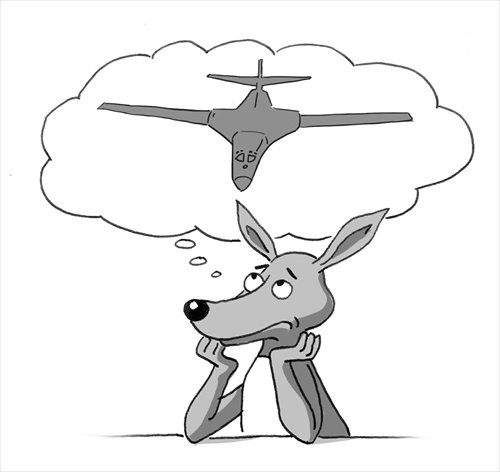


Illustration: Liu Rui/GT
Australians do not want to choose between the US and China, because both relationships are so vital to them. Their trade with China has made them rich, while their alliance with the US has kept them safe, and they hope that can continue. But the more the US and China come to see one another as strategic rivals, the harder it is for Australia to avoid making choices which will damage relationships with one side or the other.
This has been demonstrated just recently when a senior US official announced that American B-1 bombers would be placed in Darwin on Australia's north coast. Canberra was angry and embarrassed by this announcement because it specifically described the deployment of these US forces to Australia as part of the US' growing military response to Chinese actions in the South China Sea, and especially the development of facilities in the Spratly Islands (known as Nansha Islands in China).
Australia's Prime Minister Tony Abbott swiftly and firmly denied that Australia's military cooperation with the US is in any way directed against China. He repeatedly insisted that the US-Australia alliance "is not directed against anyone."
That used to be true. Until the rivalry between Washington and Beijing started to grow, Canberra could honestly claim that nothing Australia did as an ally of the US was directed at China. But that stopped being true after US President Barack Obama launched his pivot to Asia in 2011.
Since then, Washington's key strategic aim in Asia has been to resist China's challenge to US regional strategic leadership, and it clearly sees alliance with Australia as a key part of its strategy to do so. Why else would Obama have used a speech in Canberra to launch the pivot?
So as far as Washington is concerned, the US-Australia alliance is now very plainly directed at China, and it clearly expects Australia to start seeing the alliance the same way. Over recent weeks, as American officials have been foreshadowing military action to confront Chinese activities in the South China Sea, they want Australia to be willing to take part.
That is something Canberra remains very reluctant to do. Of course, Australians value their alliance with the US a great deal, and they would much prefer that the US remains the region's uncontested strategic leader in the future. Moreover, they can see that China's assertive actions in the South China Sea and elsewhere do pose a direct challenge to US leadership in Asia, and that if the US does not respond effectively then its leadership will be eroded.
Nonetheless, Canberra has clearly shown, by its reaction to the B-1 announcement, that it is not willing, at least at this stage, to support US military action directed against China.
In part that may be because it doubts that the actions the US plans are likely to be effective. Purely symbolic intrusions into air- and sea-space claimed by China, of the kind we saw last week by a US P-8A aircraft, are unlikely to have any real effect. More forceful actions risk leading to a clash of arms which might then either escalate into a full-blown conflict, or force the US into a humiliating back-down.
But beyond these important practical concerns lies a deeper strategic question. Australians must wonder whether it is wise for the US to continue to resist any serious accommodation of China's ambitions to play a larger leadership role in Asia. Might it not be better for the US to accept that a more powerful China must lay a bigger role in regional affairs, and try to reach an agreement with China on what that bigger role might be?
It would certainly be better for Australia if Washington were to seek this kind of accommodation, rather than to launch into an unrestrained strategic and political contest for regional primacy which the US might not win, and if it lost could easily lead to a US strategic withdrawal from Asia altogether.
Unfortunately, Australia's political leaders and policymakers have not yet begun seriously to consider this vital, complex and troubling question. That is because they continue to hope that the US and China will somehow avoid strategic rivalry without any fundamental change in Asia's strategic order. But as tensions mount in the South China Sea, that increasingly seems a futile hope. One way or another, Australians are going to face some tough choices soon.
 J-11 fighters in air exercise
J-11 fighters in air exercise Beauties dancing on the rings
Beauties dancing on the rings Attendants-to-be join Mr. & Miss Campus Contest
Attendants-to-be join Mr. & Miss Campus Contest Beijing's toughest anti-smoking law takes effect
Beijing's toughest anti-smoking law takes effect Family lives in cave for about 50 years in SW China
Family lives in cave for about 50 years in SW China PLA soldiers operating vehicle-mounted guns in drill
PLA soldiers operating vehicle-mounted guns in drill Blind carpenter in E China's Jiangxi
Blind carpenter in E China's Jiangxi China hosts overseas disaster relief exercise for the first time
China hosts overseas disaster relief exercise for the first time 20 pairs of twins who will become flight attendants in Sichuan
20 pairs of twins who will become flight attendants in Sichuan Obama is sowing discontent in S.China Sea
Obama is sowing discontent in S.China Sea Rescuers work through night to reach cruise ship survivors
Rescuers work through night to reach cruise ship survivors Driving through limbo
Driving through limbo Facing down MERS
Facing down MERSDay|Week